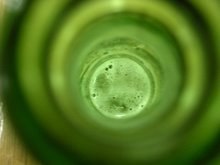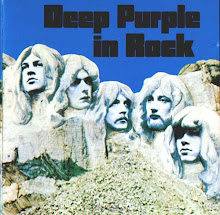An old hunger rises:
Desire for oblivion,
Escape from endless thought.
I think I have now almost completely - no, completely - suppressed the urge to drink, the habituation to think of drinking as a natural or necessary accompaniment to certain activities (like being awake [no, I jest!]). But this does not preclude the occasional resurgence of the urge to be drunk. There's only a circumstantial connection between the two. There are times when I think that if there were a pill I could (safely) take to get off my face, I'd gratefully swallow one. And I had that feeling very strongly last night, when a sudden and deep depression flooded over me.
I have long recognised that my one potential 'problem' with drinking (not an actual problem, I don't think, because I'm well aware of it, and very much on top of it) is its relationship to my depressions.
I have been ragingly bi-polar since my early teens (if not before: we're less aware of, and so remember less keenly, mood-swings and tantrums when we're very young). And since my late teens or early twenties, I have developed the habit of using alcohol to manage the experience.
The thing is, I realised quite early on that I don't entirely dislike my depressions. They are a central part of my experience of the world, they feel comfortable and familiar to me; I actually miss them when I haven't had one for a while. Not only does the rest of life seem rosier by comparison (a great consolation to try to focus on if negative feelings at the bottom of the depressive trough start to seem too overwhelming), but sensations and emotions are somehow more vivid, more intense during a depressive episode, and that is something I find stimulating, even pleasurable (although one's thoughts and feelings tend to be directed into very dark corners of the soul when depressed, so it's an unconventional - perhaps perverse - sort of pleasure, inextricably mingled with a profound distress).
For me, what's bad about depression is not the simple fact of it happening at all, but its occasional propensity to stick around for an extended period: I hate the sense of being trapped at the bottom of the trough, unsure of when or how I'm going to get out. I once took a course of SSRIs (not for depression, for a physical ailment; but I knew they were supposed to have a psychotropic impact as well, so I was curious to see how they would affect my depression, which I had been suffering from particularly badly of late), and I absolutely hated what they did to me: they almost completely flattened out my variations in mood, so that I felt stuck in exactly the same state all the time. I suppose people who 'suffer' from depression, without any of the ameliorating thrill of enhanced awareness that I experience, will be grateful to escape from its pit like this, and will interpret their new stable mood state as 'happy', or at least as an acceptable average level of contentment. And perhaps it works better for people who don't run to the bi-polar extremes, who don't balance out their depressions with corresponding spells of exhilaration and euphoria - people who are only gauging the new 'steady state' against the worst sensations they have known, not the best. For me, it was horrendous: I experienced the 'steady state' as being slightly, but significantly, below a reasonable median level; I felt mildly depressed - permanently. But without the heightened sensitivity that usually made depression tolerable for me; and, crucially, without any sense of when I might ever escape from this feeling, without any sense of control over whether I might be able to escape. I missed the emotional rollercoaster. And I missed the sense I usually have that the rollercoaster is not entirely outside of my control, that I can influence how fast I progress through its various stages.
That's where the booze comes in. I use it to ride the rollercoaster. There are other stimuli I can use as well to speed up the ride: cannabis (very occasionally), music (almost invariably - Pink Floyd and The Pogues have probably accompanied me on the ride even more often than whisky has), poetry, certain films, or just reflecting on particularly unhappy experiences in my life. But mostly I've relied on getting myself blind drunk. If I just leave a depression to run its course, it can linger for two or three days, sometimes even a week or more. If I blitz myself with alcohol, it accelerates the whole process; I can be fairly confident that it's going to shoot me out the other side very quickly, and that I'll at least be on the up-slope, if not approaching another euphoric peak, within 24 hours or so. Unfortunately.... the depth of the pit, and the speed of plummeting into it, may also be exaggerated. It seems a price worth paying in order to not be stuck at the bottom too long.
I know many people might see that as a rationalisation of addiction. But I sincerely believe I am not an addictive personality - rather the reverse, if such a thing is possible! If I do have an addiction, it is to depression itself; or to the - I know, possibly unduly romanticized - conception I have of it as a beneficial workout for the psyche, emotionally cathartic and liberating to the imagination. But I'm absolutely confident I don't have any kind of addiction to alcohol.
I have tried both ways of dealing with my depressions, making use of drink and abstaining from it. I prefer using drink, and haven't encountered any negative side-effects from so doing (such as tendency to relapse into depression more quickly, or irritability or loss of concentration... or anything). But, just to be on the safe side, I don't allow it to become my invariable policy; I make a point of enduring some of my depressions without alcohol.
Last night, though? Well, I think I'll keep that to myself, thank you.
At least I'm feeling rather better today.









